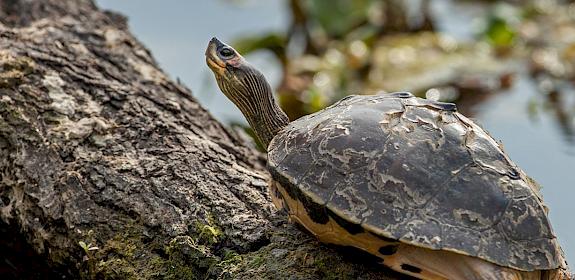Noi Bai Airport and Vietnamese Environmental Agencies Campaign Against Wildlife Trafficking
Ha Noi, Viet Nam, June 2010 – Viet Nam’s Ministry of Agriculture and Rural Development (MARD) partnered with the Civil Aviation Administration of Viet Nam to launch a U.S.-funded training course to help end wildlife trafficking.

The “Wildlife Trade Regulation Courses”, held 1–2 June and 3–4 June for staff of Noi Bai International Airport, trained approximately 70 airport staff and enforcement officers to combat wildlife trafficking. Airport personnel including check-in counter attendants, baggage handlers, Customs officers, immigration staff and security officials were joined by members of INTERPOL, Customs, Environmental Police and the CITES Management Authority to receive the training.
Following the training, participants reported that the course had been very useful and that they were now better equipped to support the fight against illegal wildlife trade. The two back-to-back workshops provided participants with knowledge of the impacts of illegal wildlife trade, the Convention on International Trade in Endangered Species of Wild Fauna and Flora (CITES), relevant national legislation, smuggling techniques, species identification, and the handling of confiscations.
The event built upon an awareness-raising campaign that began in May with the installation of a large, eye-catching anti-wildlife trafficking billboard on the road to the Noi Bai International Airport and banners in both English and Vietnamese were placed around the training venue in Ha Noi to promote awareness of the event and conservation.
Airports around the world and particularly those in Southeast Asia play key roles as transport hubs for illegal wildlife trade. While seizures at international airports are becoming more common, it is believed that a significant portion of illegal trade passes undetected. There is now increasing recognition that airport and airline employees can play an important role in stopping wildlife trafficking. With proper training, their capacity can be increased to detect incidences of wildlife smuggling during the course of their daily duties.
“It’s time to put a stop to criminals using our airports to smuggle protected and endangered species” said Mr. Nguyen Ngoc Binh, Deputy Director General of Viet Nam’s Directorate of Forestry. Mr. Binh added that “only by working together can we hope to effectively counter well organized and financed crime syndicates involved in the illegal wildlife trade”.
MARD’s Directorate of Forestry helped facilitate the training through its association with the ASEAN Wildlife Enforcement Network (ASEAN-WEN), the largest regional environmental law enforcement network in the world. The US Agency for International Development (USAID) and the US Department of State support ASEAN-WEN’s efforts to stop wildlife trafficking in Southeast Asia. Technical assistance to ASEAN WEN is provided jointly by TRAFFIC, the wildlife trade monitoring network, and FREELAND Foundation.
This was the eighth training of its kind in Southeast Asia. The course has been presented to more than 1100 participants throughout the region, most recently at Suvarnabhumi International Airport, Bangkok, and the Kuala Lumpur International Airport, Malaysia.
Notes:
1. ASEAN-WEN is the Association of Southeast Asian Nations Wildlife Enforcement Network. It involves environmental, law enforcement and customs agencies in all 10 ASEAN countries and facilitates cross-border collaboration in the fight against illegal wildlife trade in the region. Launched in Bangkok on December 1, 2005, it now is the world’s largest wildlife enforcement network.
2. Viet Nam’s CITES Management Authority is the ASEAN-WEN focal point within the country. Together with the Forest Protection Department and Conservation Division, the CITES Management Authority works under the newly established Directorate of Forestry within the Ministry of Agriculture and Rural Development.
3. Two international non-governmental organizations, FREELAND Foundation (formerly PeunPa) and TRAFFIC, via a cooperative partnership with the U.S. Agency for International Development (USAID), provide technical assistance to government agencies implementing ASEAN-WEN.
4. The ASEAN-WEN Program Coordination Unit has released a detailed update and statistical summary of major interdictions against illegal wildlife trade by Southeast Asian law enforcement authorities for 2009. It is available from the ASEAN-WEN website (www.asean-wen.org).
For additional information visit the ASEAN-WEN website (www.asean-wen.org), the USAID Regional Development Mission for Asia website (www.usaid.gov/rdma/), and USAID/RDMA’s pages devoted to ASEAN-WEN (www.usaid.gov/rdma/programs/activity_73.html).




